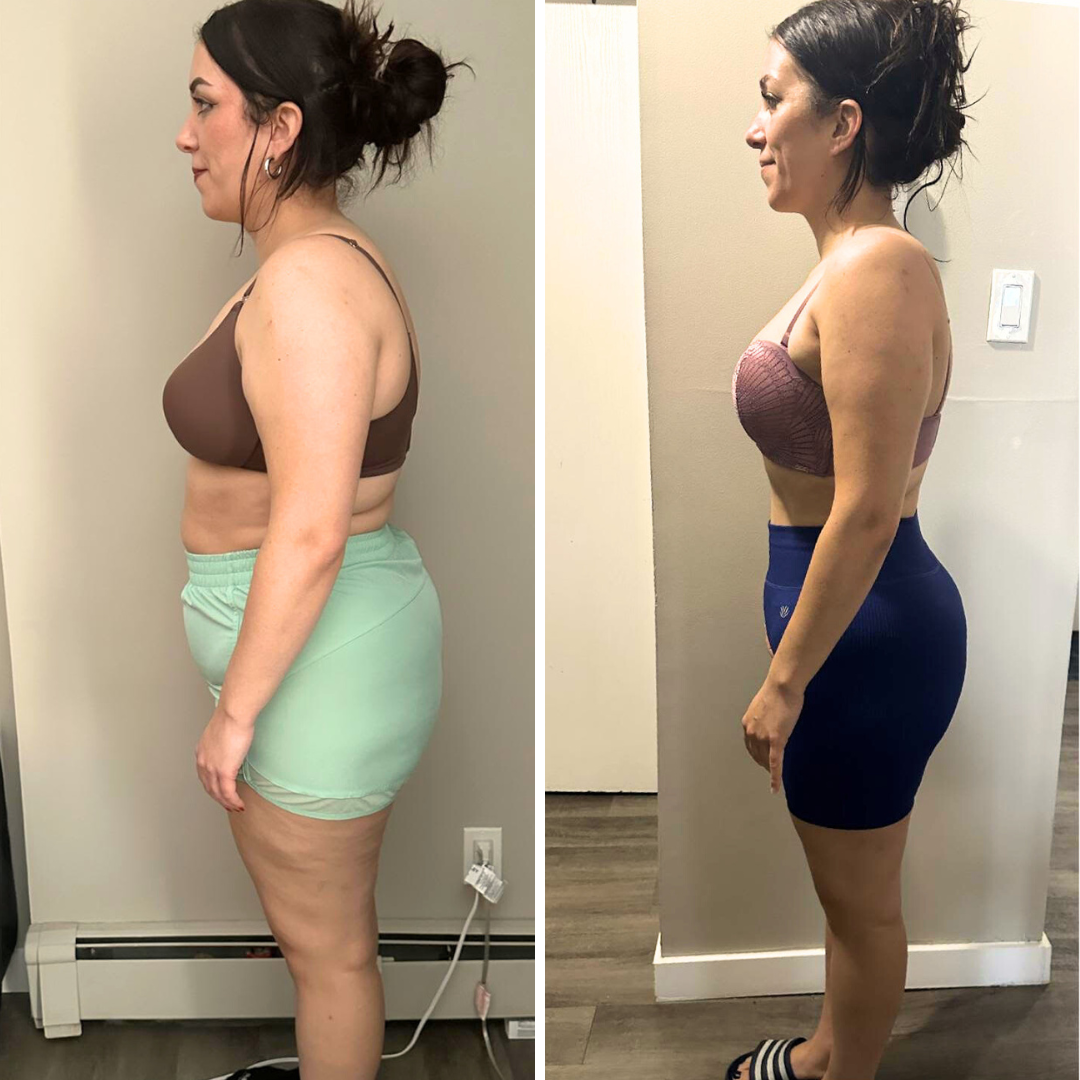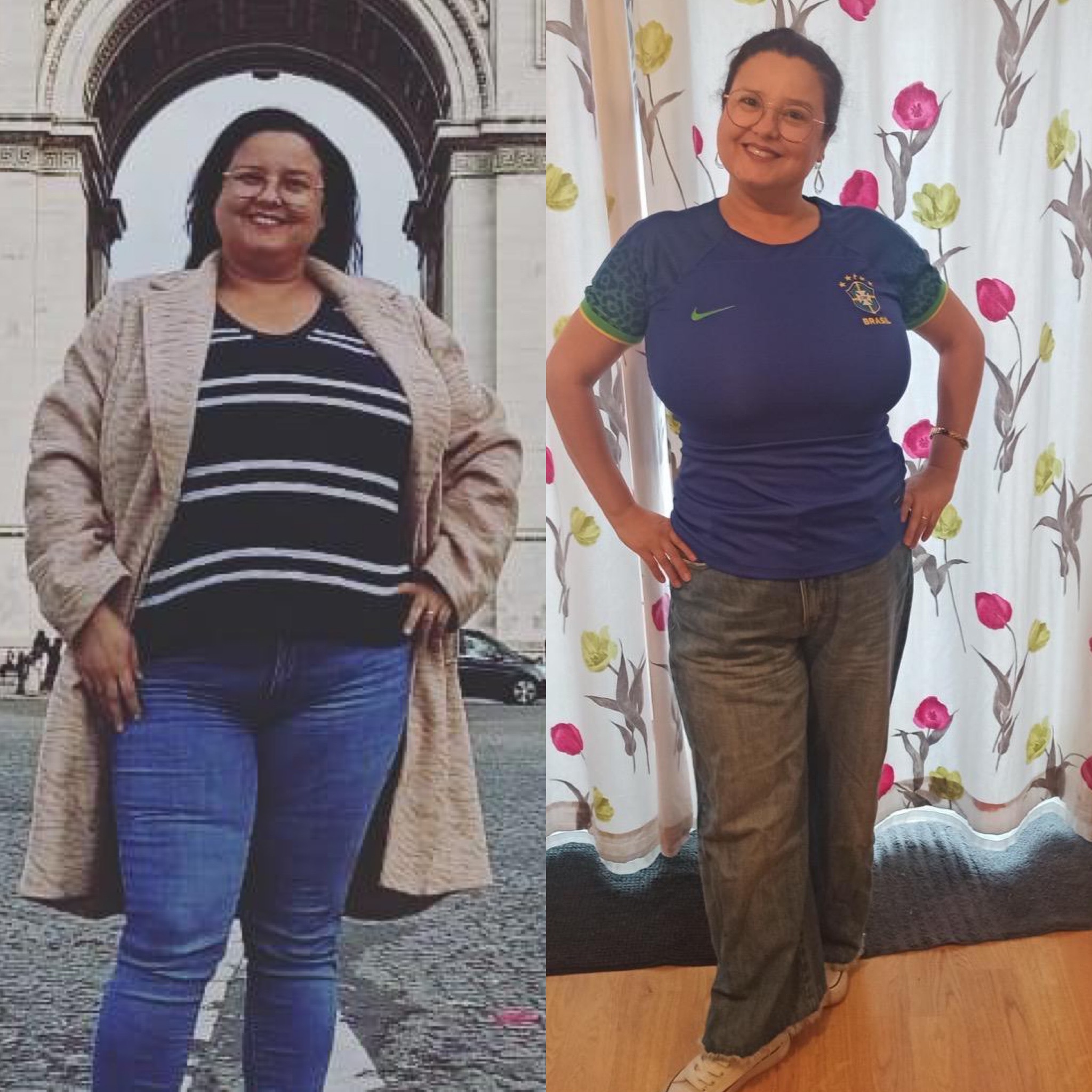How to Lose Weight During Menopause

Is it possible to lose weight while in menopause? Yes, it is! This is a very common question my team and I get asked in my practice. I am a registered dietitian, and in this article, I will show you practical tips on achieving it. Menopause is a phase in a woman’s life that involves emotional and physical changes. Some women experience more symptoms than others, and some women stay in the peri-menopause (the period before menopause starts) for a long time, and in this case, the symptoms are usually starting already. The symptoms that peri-menopause and menopausal women can have are usually weight gain, difficulty in losing weight, hot flashes, mood swings, hair thinning and insomnia. However, the right approach to nutrition, exercise, and support can make a real difference in managing weight and the symptoms during this time. In this blog post, I’ll explore how to lose weight during menopause, what to eat, lifestyle changes to consider, and how a nutritionist can help you during this transition with a personalised plan tailored to your needs.
Understanding the Impact of Menopause on Weight
Menopause marks the end of a woman’s menstrual cycle, typically occurring between the ages of 45 and 55. During this time, there is a decline in the production of hormones such as estrogen and progesterone. These hormonal changes can lead to weight gain, particularly around the abdomen, and can make it more challenging to lose weight. The body’s metabolism also tends to slow down during menopause, which means it requires fewer daily calories per day to function.
Additionally, many women experience symptoms like hot flashes, night sweats, fatigue, and mood swings, which can affect their ability to stick to healthy eating and exercise routines. Understanding how menopause affects the body is crucial in developing an effective plan for weight loss and symptom management.
How a Nutritionist Can Help During Menopause
A nutritionist is an important part of your weight loss journey during menopause. Here’s how we can help:
-Having someone to talk to and discuss your unique symptoms, food preferences, lifestyle and goals is crucial for success in achieving weight loss during menopause.
The nutritionist will design a meal plan according to your metabolism, calculating the right calories and macronutrients like carbohydrates, fat and proteins for your body. Everyone is unique, so especially in this phase, one-diet-fits-all is not the best approach. It can be frustrating trying a generic diet and not seeing results. Many women might give up after a few attempts. However, if you have something personalised to your body and the support and accountability of a professional who will be able to help and answer all your questions, there is less room for frustration.
Furthermore, setting realistic goals is very important, and the nutritionist should be experienced in knowing what can be achieved in a certain time frame.
Additionally, a nutritionist will be able to recommend any supplements you might need with the right dosage and timing.
What to Eat During Menopause for Weight Loss
Some key foods can be beneficial to consume during menopause:
- Flaxseed: Rich in omega-3 fatty acids, flaxseed can help balance hormones, reduce inflammation, and support heart health. It’s also high in fibre, which aids digestion and keeps you feeling full longer.
- Salmon and Oily Fish: Omega-3 fatty acids in salmon and other fatty fish help reduce inflammation, promote heart health, and support fat loss. They can also alleviate symptoms like hot flashes.
- Antioxidants: Blueberries, dark chocolate (in moderation), and green tea are rich in antioxidants, which help combat oxidative stress and inflammation associated with menopause. These can also promote healthy skin and support metabolism.
- Nuts: Walnuts and almonds are particularly beneficial during menopause. They contain phytoestrogens, which are plant compounds that might help with menopause symptoms. They also help control blood sugar levels, reduce cravings, and provide healthy fats that support overall health.
- Protein-rich foods: As menopause can lead to muscle loss, it’s essential to include adequate protein in your diet. Lean meats, poultry, eggs, tofu, and legumes can help preserve muscle mass and promote weight loss.
- Vegetables and Whole Grains: Non-starchy vegetables like leafy greens, broccoli, and bell peppers, as well as whole grains such as quinoa and brown rice, provide essential vitamins, minerals, and fibre without spiking blood sugar levels.
What to Avoid During Menopause
Some foods can make the menopause symptoms worse. Be aware of the:
- Sugary Foods: High sugar intake can lead to weight gain, increased insulin resistance, and blood sugar imbalances, which can worsen symptoms like hot flashes and fatigue.
- Simple Carbohydrates: Refined carbs found in white bread, pasta, and baked goods can contribute to weight gain and cause blood sugar spikes and crashes. Instead, opt for complex carbohydrates that provide steady energy.
- Processed Foods: Many processed foods are high in unhealthy fats, sodium, and sugar, which can increase inflammation and disrupt hormonal balance. Focus on whole, unprocessed foods for optimal health.
- Alcohol: excess of alcohol can increase hot flushes
- Spices: can trigger hot flushes by increasing blood vessels
Supplements to Consider During Menopause
Many nutrients like vitamins, minerals and herbal medicine can be beneficial to boost wellbeing during menopause. Some of my favourites to recommend are these:
- Vitamin D: Vitamin D is crucial for bone health, especially during menopause when bone density can decrease. It also plays a role in regulating mood and immune function.
- Omega-3 Fatty Acids: These healthy fats help reduce inflammation, improve mood, and support heart health.
- Magnesium: Magnesium is vital for managing stress, supporting sleep, and reducing symptoms like night sweats and muscle cramps. It can also promote a healthy metabolism.
Lifestyle Changes to Support Weight Loss During Menopause
Of course, not only a good diet will enhance weight loss and symptom management during menopause, but it is also essential to pay attention to a few lifestyle aspects:
- Weightlifting: Strength training exercises, such as weightlifting or resistance training, help maintain muscle mass. This is very important to improve your metabolism as more muscle means higher metabolism. During menopause, muscle mass decreases, so weight lifting and strength exercises are essential at this stage.
- Practice Stretching and Pilates: Stretching and Pilates can help improve flexibility, posture, and muscle strength while also reducing stress and enhancing overall well-being.
- Stay Active: Regular physical activity, such as walking, swimming, or cycling, is essential for maintaining a healthy body and managing menopausal symptoms. Aim for at least 30 minutes of moderate exercise most days of the week.
- Stress Management: Practicing relaxation techniques such as yoga, deep breathing, and meditation can help manage stress, reduce cortisol levels, and prevent emotional eating.
Progress Expectations: Managing Menopause Symptoms and Weight Loss
When starting a weight loss journey during menopause, it’s important to have realistic expectations. For some, weight loss during menopause tends to be slower, but a typical rate of 0.5 to 1 kilogram per week is realistic. However, with a tailored approach to nutrition, exercise, and support, you can see steady progress.
Additionally, managing menopausal symptoms such as hot flashes, mood swings, and sleep disturbances may take time. With the right diet, supplements, and lifestyle changes, these symptoms can be alleviated, and your overall well-being can improve.
Losing weight during menopause requires a holistic approach that combines personalised nutrition, supplementation, and lifestyle changes. A menopausal nutritionist can be your greatest asset in designing a meal plan that suits your needs, preferences, and goals. With professional guidance, you can navigate this phase of life with confidence, managing symptoms effectively and achieving sustainable weight loss.
If you’re struggling with weight loss during menopause, it’s time to seek professional help. A personalised meal plan, tailored supplements, and ongoing support can make all the difference in managing your weight and menopause symptoms. Remember, you’re not alone—help is available, and with the right support, you can achieve your health goals during this transformative phase of life. Get in touch, and we can help you to tailor the best nutrition plan for you.
Get an action plan with a Free Assessment!
Get personalized insights to enhance your well-being and achieve your goals. In this 15-minute video call, we will listen to you and guide you on what you need to do.
Schedule Your Free AssessmentRecent blogs







